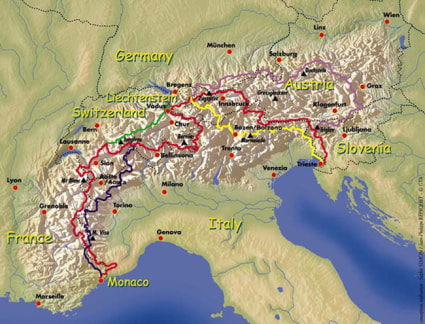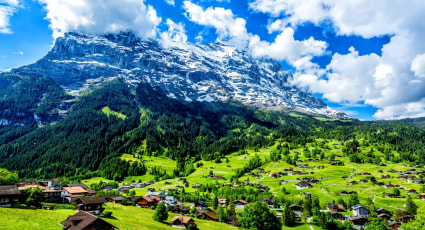Walking Is Good For You!
Posted by Jeremy Windsor on Feb 7, 2020
What happens to your body when you wake up one morning and decide to take a long walk in the mountains? The answer can be found in a fascinating case study published in Wilderness and Environmental Medicine!
Over the course of 3 months, a 62 year old man set about walking the Via Alpina. Carrying his own food and camping equipment he began in Trieste and crossed more than a dozen mountain ranges before stopping on the outskirts of Genoa. In all, he walked 1313kms and made 62,480m of ascent. If all that wasn't enough, he completed a battery of physiological tests along the way. Here are 5 of the study's key findings...

The Via Alpina is a network of 5 long distance hiking trails stretched across the alpine regions of Austria, France, Germany, Italy, Liechtenstein, Monaco, Slovenia and Switzerland. The longest is the Red Trail which links together Trieste and Monaco.
-Body weight fell by 10% - from 75 to 68kgs. This represented a reduction in BMI from 23.5 to 21.4 and was predominantly due to fat loss - his percentage body fat fell from 20.3 to 15.1%.
-HDL Cholesterol and Triglyceride measurements improved dramatically during the walk. Ten days later, HDL Cholesterol had returned to normal however the Triglyceride measurement remained almost 50% below it's starting value.
-VO2 Max increased significantly - from 41 to 50ml/kg/min. This was probably due to a combination of prolonged periods of moderate aerobic exercise and the effect of altitude acclimatisation.
-The subject didn't get any quicker and maximum voluntary force in the knees and elbows did not change.
-Full blood count and liver function tests did not change. Small increases in creatine kinase, myoglobin, c-reactive protein and pro brain natriuretic peptide (BNP) were observed. The latter may have been due to a rise in pulmonary artery pressure caused by exercise, cold and altitude exposure.

Over the course of 92 days walking the Via Alpina the subject consumed a total of 380,539 Kcal - that's approximately 4,136Kcal every day!
But perhaps there's more to walking than just these measurements? Here's a quote from Shane O'Mara's wonderful book, "In Praise Of Walking" where he describes what might be going on elsewhere in the human body,
"We all know that walking is good for our heart. But walking is also beneficial for the rest of our body. Walking helps protect and repair organs that have been subjected to stresses and strains. It is good for the gut, assisting the passage of food through our intestines. Regular walking also acts as a brake on the ageing process of our brains, and can, in an important sense, reverse it. Recent experiments asked elderly adults to participate in thrice-weekly, and relatively undemanding, walking groups*. In the regular walking group, over the course of a year, the normal ageing of brain areas providing the scaffolding for learning and memory is somewhat reversed in the walkers, by perhaps about 2 years or so. An increase in the volume of these brain areas was also found; this is quite remarkable in itself, suggesting that the act of regular walking mobilises plastic changes in the very structure of the brain, strengthening it in ways similar to how muscles are strengthened when worked."
Do you walk enough? Could you walk more?
*This refers to a series of studies that looked at exercise upon hippocampal size. Please get in touch if you'd like the references.
Want to take a look at something from the archive? Why not try this?
If you'd like to write for us please get in touch!
Comments
Leave a comment.
Leave a comment.



 )
)